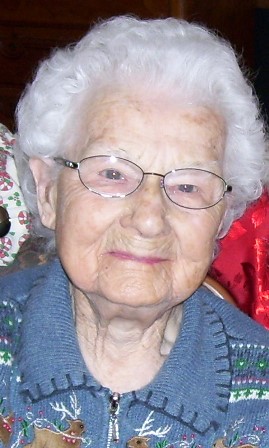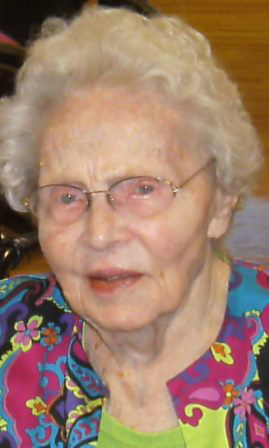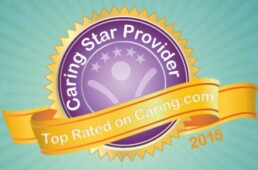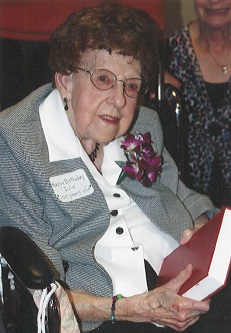Three Ecumen Communities Awarded Minnesota State Arts Board Grants To Enhance Creative Experiences for Seniors
The Minnesota State Arts Board has awarded grants totaling just over $46,000 to three Ecumen communities to encourage artistic development and creativity among older adults through the Partners in Arts Participation program.
Top 5 Blog Posts - January 19
Did you miss last week's most-read Changing Aging blog posts? Ecumen's online visitors found these articles most interesting:
Her shift starts at 6 a.m. Dawn Bolhuis, LPN, a long-term care nurse at Ecumen Pathstone Living in Mankato, Minn., will not be late. Her residents depend on her, and, like every other morning, she can't wait to see how they are doing today. And they can't wait to see her.
Oscar Contender "Still Alice" Dramatically Captures Alzheimer's
Critics are raving about the movie "Still Alice" and Julianne Moore's compelling performance as a 50-year-old mother, wife and college professor who is diagnosed with early-onset Alzheimer's. In the clip below from NBC News, the actress talks about her determination to give an accurate portrayal of the disease that affects more than five million Americans.
An Extraordinary Act of Appreciation and Generosity at Ecumen Seasons at Apple Valley
On New Year's Eve, a family brought 82 sealed holiday cards to the frotn office at Ecumen Seasons at Apple Valley. Their Mom and Dad live there, and they asked the office staff to hand out a card to each employee.
Ecumen Centennial House Resident Charles Hearn Went to Battel on the Silver Screen
Charles (Chuck) Hearn was a good soldier who took a few bullets over the years. He was always comfortable on the battlefield - a place where he could feel connected to the memory of his relatives who fought in the Civil War.
Ecumen Century Club: Happy 100th Birthday Eleanore Ebeling
Ecumen honors Eleanore Ebeling, who is 100.
You can read these articles and more at www.ecumen.org.
Ecumen Century Club: Happy 105th Birthday Judith Johnson
 Ecumen honors Judith Johnson, a resident of Ecumen Parmly LifePointes, who is 105.
Ecumen honors Judith Johnson, a resident of Ecumen Parmly LifePointes, who is 105.
Top 10 Gifts for Seniors: Ecumen Staff Offers Advice
 We polled staff at several Ecumen communities for their advice on holiday gift-giving for seniors, particularly those who are in assisted living or care centers. Here are the top 10 suggestions.
We polled staff at several Ecumen communities for their advice on holiday gift-giving for seniors, particularly those who are in assisted living or care centers. Here are the top 10 suggestions.
Home for the Holidays: Red Flags That Aging Parents Need Help
Here's some advice on what to do when you go home for the holidays and see signs that your aging parents need help.
Ecumen Century Club: Happy 100th Birthday Thelma Whitton
 Ecumen honors Thelma Whitton, a resident of Ecumen Parmly LifePointes in Chisago City, Minn., who is 100.
Ecumen honors Thelma Whitton, a resident of Ecumen Parmly LifePointes in Chisago City, Minn., who is 100.
Ecumen Among Panelists At Common Good Breakfast Series in Minneapolis on Navigating the Senior Bubble
Common Good Breakfast series event on October 30th in Minneapolis to look at "Navigating The Senior Bubble."
Top Five Blog Posts - September 29
In case you missed out on some of last week's Changing Aging blog posts, here are the stories Ecumen's online visitors found most interesting:
Adeline Carlson, a Gold Star Mother Living at Ecumen Detroit Lakes, Remembers That Day - Always
Ecumen CEO Kathryn Roberts Among Women Leaders Honored by George Family Foundation
Ecumen's Paul Libbon Named to Aging Services of Minnesota Board
Honoring the Rich Tradition of Volunteerism at Ecumen Parmly LifePointes
Ecumen Century Club: Honoring the Always Positive Pearl Nelson, 103
To read more Changing Aging stories or to learn more about Ecumen, please visit www.ecumen.org.
“Smile” on Ecumen When You Shop on Amazon
Amazon.com now offers a simple way to support your favorite charitable organization every time you shop — at no cost to you.
When you shop at smile.amazon.com, Amazon automatically donates 0.5% of the price of your eligible AmazonSmile purchases to the charitable organization of your choice.
Most all Amazon products are eligible for donations, and all IRS-register charitable organizations qualify for contributions.
We hope you will “smile” on your favorite charitable organization. And we hope that’s Ecumen.
See AmazonSmile’s FAQ for more details and this USA Today story about the new program.
Ecumen Joining City of Apple Valley In Design Workshop Focused on Making Aging Advantageous to Cities
How does a city actually become “age friendly” to create competitive advantage amidst unprecedented demographic change?
Answers will come in a unique three-day work workshop September 30th to October 2nd in Apple Valley, Minnesota, which like most American communities is grappling with these very questions as their populations grow older in record numbers. Local, national and global experts from diverse sectors will create a roadmap for Apple Valley and cities globally that desire to turn “Age Friendly Community” from a phrase into a reality.
The workshop will be convened by Vitalocity! – a new consultancy founded by a group involving Ecumen , Kendal Corporation a Pennsylvania-based senior services nonprofit company, and BusinessLab, a UK-based global strategy consultancy. From September 30 through October 2, these founding partners will be joined by Apple Valley residents and community leaders along with representatives from global organizations such as the International Federation on Ageing, a World Health Organization (WHO) partner; Perkins Eastman, an international architectural and design firm; Sodexo, which provides nutritional and other quality of life services to more than 75 million consumers worldwide and global technology company, IBM.
The Problem: Our Cities Aren’t Designed for Aging
In today’s cities, if you’re not spry and mobile, you’re largely out of luck. This isolates people, limits their contributions to a city’s social and economic vitality, and can have significant health impacts.
Exploring this phenomenon in depth, WHO created the WHO Age Friendly City Framework, which provides eight characteristics (below) necessary for an age friendly city. The Framework is a critically important step in creating cities for all ages and stages, and more than 250 cities have subscribed to its tenets. But no entity exists globally that cities can turn to for cohesive planning and technical advice to turn the Framework into results.
Vitalocity! seeks to change that by bringing diverse skills and expertise together to help cities deliver phased, measurable, quantifiable results based on the eight components (below) of the WHO’s Age Friendly City Framework:
- Respect and social inclusion
- Outdoor spaces and buildings
- Transportation
- Communications and information
- Social participation
- Housing
- Community support and health
- Civic participation and employment
Our Cities’ Changing Population Driving Age-Friendly Strategy
For the first time in history, more than half of the human population - 3.3 billion people - live in cities. By 2030, this is expected to swell to almost 5 billion. And this population is getting older. For example, in the last 10 years, in every one of America’s 51 largest major metropolitan areas, the number of children relative to the number of elderly has declined. In Pittsburgh, which is America’s oldest city demographically, almost 25% of the metro area’s population is over 60.
Locations long considered magnets for the young and hip are also aging rapidly. In Manhattan and San Francisco, almost 20% of the population is over 60, well above the national average.
According to a new report by Harvard’s Joint Center for Housing Studies and AARP, in 1990, less than 5 percent of U.S. counties had a population where adults over 50 made up more than 40 percent of the community (that was 156 counties). By 2010, this was true of 33 percent of all U.S. counties (or 1,031 of them). The U.S. population over age 65 is expected to include 73 million people by 2030 (that's about 33 million more than today).
And most of these people live in metropolitan areas, particularly suburbs, making Apple Valley an ideal location to launch this important work and turn age friendly design in our world from concept to reality.






